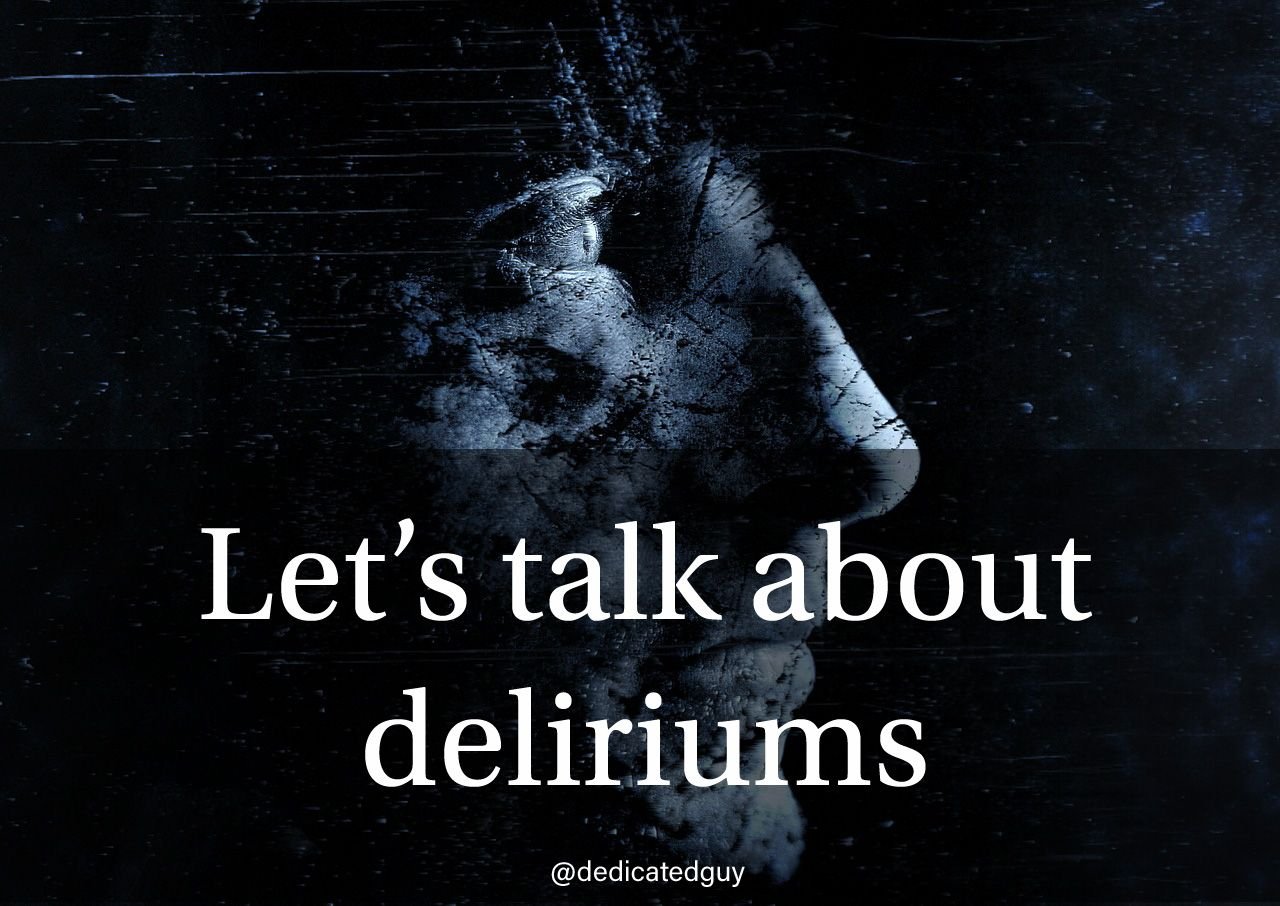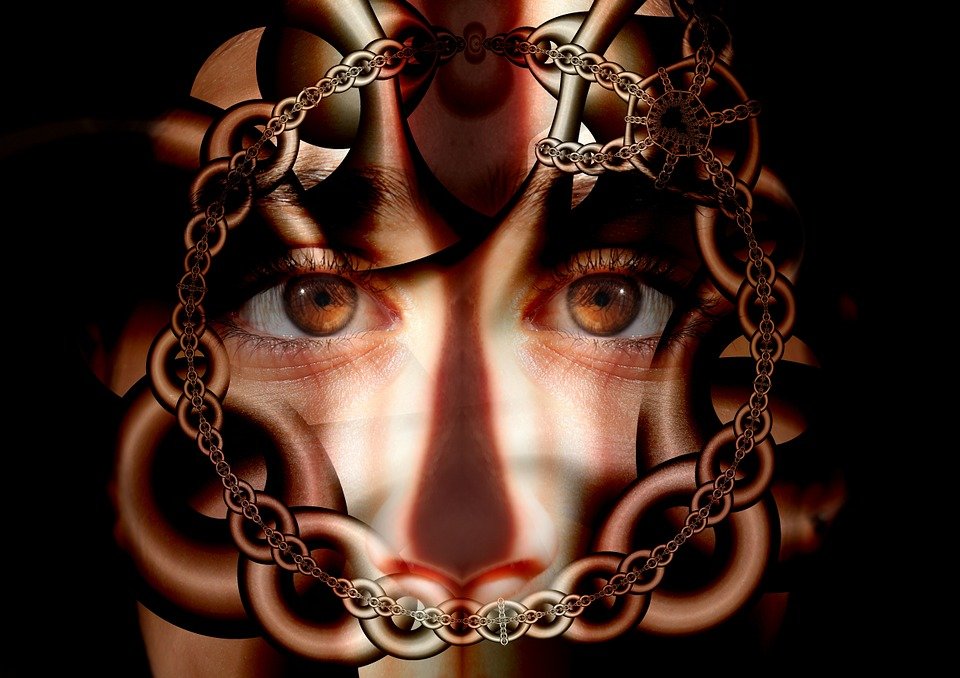
It is common that on some occasions, and especially under high levels of stress, we are faced with the firm belief that someone is watching us, that someone is following us or that someone is talking about us even though this is not true.
However, when these thoughts flood the mind of the person and become unable to see reality in a proper way we can talk about the popular deliriums.

What are deliriums?
Delirium is a condition of severe confusion and rapid changes in brain function. Delirium in itself is not a disease, but rather a cluster of symptoms that may result from a disease or other clinical process. | Source

Delirium, a mental disturbance marked by disorientation and confused thinking in which the patient incorrectly comprehends his surroundings. The delirious person is drowsy, restless, and fearful of imaginary disasters. | Source
Delirium is about having an erroneous belief or thoughts that the person is fully convinced to be real, even though there is no evidence that can backup those beliefs.
It is not considered a disease or mental disorder by itself, but rather it would be a symptom of a wide variety of psychological conditions such as bipolar disorder, schizophrenia, mania, among others.
During the course of the delirium the mental state of the person suffers a great amount of changes that can cause this person to experience sensations of confusion and some alterations in the behavior, as well as emotional swings, sleep issues and memory issues.

How can a delirium be identified as such?
Certain symptoms are:
- Disorganized thinking
- Decrease in short-term memory and recall
- Changes in level of consciousness or awareness
- Speech that doesn't make sense (incoherence)
- Inability to think or behave with purpose. | Source
For a delirium to be considered as such, it must comply with a series of special and specific characteristics that are key when identifying if a false belief is a delirium or not.
The delirium must continue over time, being almost impossible for this to be modified or corrected independently of the evidence that there is against the belief, this is because a delirium is a strongly held idea. Which means, the person totally believes in it no matter what.

It is necessary to specify the idea that the patient has can not be shared by other people or cultural group. This means that for the idea to be considered illogical it cannot be shared by the social circles of the person nor by the rest of society.
The person also has a great worry about the delusional thought, which implies a considerable psychological wear since he is thinking about it constantly in an obsessive way.
What are the causes of this condition?
Delirium may be caused by diseases of body systems other than the brain; drug abuse; infections, such as urinary tract infections; poisons; fluid/electrolyte or acid/base disturbances; and by other serious, acute conditions. | Source
Deliriums have as their origin a series of mental and psychological disorders that shape it, such as paranoid disorders, schizophrenia, psychotic depression and mania.
However, they can also be part of other alterations derived from the consumption of drugs and alcohol abuse, as well as detoxification processes and as a secondary reaction to certain drugs.

What type of believes are commons with deliriums
With paranoid ideas, the individual fully believes that another person or group wants to cause some kind of damage, be it physical, psychological or social. This delirium is about the idea that others want to kill the person or that someone is trying to drive the person crazy.
On the other hand, people suffering from persecution delirium strongly believe they are being chased or stalked by someone, or even that there is a conspiracy against them. This persecution can be anywhere either on the street or even in their home. These people may think there are others entering their home, opening their mail or checking their smartphones or computers.

There is also the delirium in which people tend to think they have immense greatness, and this is manifested through an excessive self-assessment of the person's skills and knowledge since said person attributes to himself special abilities as well as a great exaggeration of his own identity.
Some other people might tend to think that certain events, phrases or statements coming from other people are about them, or have a hidden message to them, it is common for these individuals to think that both media and other people are sending them all kinds of messages so they remain permanently alert, trying to not miss anything that is being said.
These are simply one of the most commons ideas that can end up in a delirium, but actually any type of believe can degenerate itself and become an obsession.

Conclusion
After reading all of this about deliriums, you might be thinking they are the same as having hallucinations, but this would actually be wrong.
It is important for everyone to understand that having a delirium is not the same as having an hallucination, the fact that its common for them to be presented together and besides they also share certain characteristics makes these 2 concepts to be frequently confused. However, once it is clear what deliriums are, it becomes much easier to tell them apart.

Hallucinations unlike deliriums, are just creations coming from the person's mind. That is, they do not really exist in the real world. In addition, just as delirium is simply a thought or a belief, hallucinations can be involve our different senses (Sight, Sound, Smell, Taste, and Touch) to create experiences. Therefore, the main difference between these 2 issues is that hallucinations are simply a creation coming from the person’s mind, while a delirium would be a distortion of an external stimulus.
With a delirium the person can sense a real stimulus such as sounds coming from the TV that is distorted by the mind or interpreted as a kind of communication specifically for him. While with hallucinations, there wouldn’t be any real sound, it would just be part of the person’s imagination.
Delirium is simply about having a belief or misinterpretation of reality based on a fact, a situation or a real stimulus. However, both concepts have a common point which is that people are fully convinced that whatever they are perceiving is real.
Have you ever experienced some kind of delirium? If so, what was it?
References
psychiatryonline - guidelines about delirium
Images sources
All images are from pixabay

If these titles sound interesting to you, I assure you the articles will be even better!

Why are some people hypocrites?
Why some people are always late to everything?
How can suggestions affect our lives?
Meet Lympo: the blockchain project that rewards you for leading a healthy and active life.
